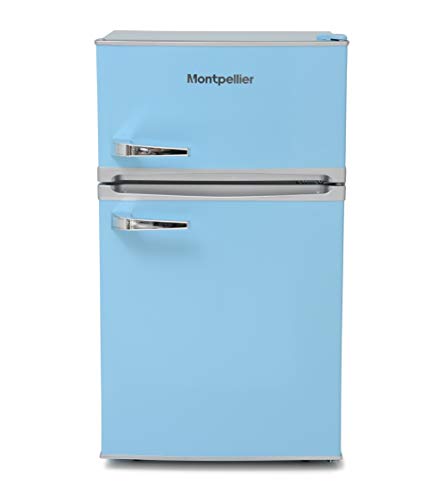The Best Fridges And Freezers Tricks To Rewrite Your Life
페이지 정보
작성자 Rosella 댓글 0건 조회 4회 작성일 25-08-06 11:49본문

Understanding Fridges and Freezers: The Essential Kitchen Appliances
Refrigerators and freezers are two of the most vital devices in modern-day kitchens. These home appliances serve a crucial function in food conservation and waste reduction by making sure that disposable products remain fresh and safe for consumption. This short article delves into the different kinds of fridges and freezers, their functionalities, and crucial considerations for selection and maintenance.
Kinds of Refrigerators
The marketplace offers a range of refrigerator types, each created to satisfy different consumer requirements. Below is a list of the most common kinds of fridges:
Top-Freezer Refrigerators
- Most typical type.
- Freezer compartment is situated above the refrigerator section.
- Generally more affordable and energy-efficient.
Bottom-Freezer Refrigerators
- Freezer is located at the bottom.
- Permits much easier access to fresh products at eye level.
- Frequently features pull-out drawers for much better organization.
Side-by-Side Refrigerators
- Refrigerator and freezer sections are surrounding.
- Ideal for narrow cooking areas and allows easy access to both compartments.
- Frequently includes water and ice dispensers.
French Door Refrigerators
- Combines a bottom freezer with double doors at the top.
- Offers sufficient storage and elegant styles.
- Often consists of features like temperature-controlled drawers.
Compact Refrigerators
- Smaller sized size perfect for minimal areas.
- Typically used in dorm spaces, studio apartments, or as secondary fridges.
Table 1: Comparison of Refrigerator Types
| Type | Benefits | Disadvantages | Common Size |
|---|---|---|---|
| Top-Freezer | Budget-friendly, energy-efficient | Less practical access to the freezer | 14-30 cu. ft. |
| Bottom-Freezer | Easier access to fresh food | Freezer can be harder to arrange | 19-30 cu. ft. |
| Side-by-Side | Easy access, water/ice dispenser | Narrow vs. storage area | 22-30 cu. ft. |
| French Door | Trendy, roomy, arranged | More pricey | 20-30+ cu. ft. |
| Compact | Space-saving, portable | Limited storage | 1.7-5.5 cu. ft. |
Types of Freezers
Freezers are an equally important home appliance for food conservation. They are available in various styles designed to fit various home needs. Think about the list below types:
Upright Freezers
- Operate like a standard refrigerator with vertical storage.
- Simpler to organize with shelves and compartments.
Chest Freezers
- Large, horizontal style generally using more storage area.
- Maintains temperatures better throughout power interruptions.
- More energy-efficient than upright designs.
Portable Freezers
- Compact systems perfect for outdoor activities or small spaces.
- Typically utilized for camping trips or as momentary storage.
Table 2: Comparison of Freezer Types
| Type | Advantages | Downsides | Normal Size |
|---|---|---|---|
| Upright Freezer | Much easier to organize | Less energy-efficient, more floor space | 5-20 cu. ft. |
| Chest Freezer | Holds more products, energy-efficient | Harder to arrange | 5-25 cu. ft. |
| Portable Freezer | Compact and flexible | Restricted storage capacity | 1-10 cu. ft. |
Key Features to Consider
When choosing a fridge or freezer, customers need to bear in mind numerous functions that can enhance functionality:
- Energy Efficiency: Look for models with the ENERGY STAR certification to minimize electrical energy bills.
- Storage Capacity: Evaluate storage requirements based on family size and eating practices.
- Temperature Control: Some appliances provide digital controls for accurate temperature level settings.
- Adjustable Shelving: Customizable shelving permits optimum organization.
- Water and Ice Dispenser: Offers benefit but can take up valuable space inside.
- Sound Level: Sound ratings can influence comfort, particularly in open-concept homes.
Advantages and disadvantages of Having a Fridge and Freezer
While fridges and freezers are indispensable innovations, they also have certain advantages and disadvantages:
| Pros | Cons |
|---|---|
| Maintain food life expectancy and reduce waste | Need regular upkeep |
| Permit bulk buying and meal prepping | Can be costly to purchase and run |
| Deal convenience and fast access to food | Occupy significant kitchen area space |
Upkeep Tips
To guarantee durability and optimal efficiency of fridges and freezers, consider the following maintenance tips:
- Regular Cleaning: Clean the exterior and interior occasionally to prevent buildup of dirt and bacteria.
- Examine Seals: Inspect door seals routinely for leaks to preserve efficiency.
- Temperature Settings: Keep the fridge at 34-38 ° F and the freezer at 0 ° F for ideal food preservation.
- Thaw as Needed: Chest freezers ought to be thawed regularly to preserve effectiveness.
- Clear Air Vents: Ensure that air flow isn't blocked to enhance energy performance.
Frequently asked questions About Fridges and Freezers
Q1: How long can food be saved in a freezer?A: Most foods can be kept in a freezer for numerous months. Meats and poultry typically last 4-12 months, while veggies can last as much as 8-12 months.
Q2: How frequently need to I clean my fridge and freezer?A: It is suggested to clean your fridge and freezer every 3 to 6 months, or as required when spills occur. Q3: Can I put hot food directly in the fridge?A: It is recommended to cool hot food to space temperature level before putting it in the fridge to prevent
raising the temperature level inside the appliance. Q4: Why is my fridge running constantly?A: This could be due to a malfunctioning thermostat, stopped up coils, or door seals that aren't working correctly. Fridges and freezers are indispensable
assets to contemporary households, supplying important services for food storage and conservation.
Comprehending the numerous types, functions, and upkeep requirements can help customers select the best fridges devices for their requirements and maximize their performance. Welcoming energy-efficient designs not only supports sustainable practices but also contributes to significant savings on energy bills, making notified choices more crucial than ever.
댓글목록
등록된 댓글이 없습니다.

